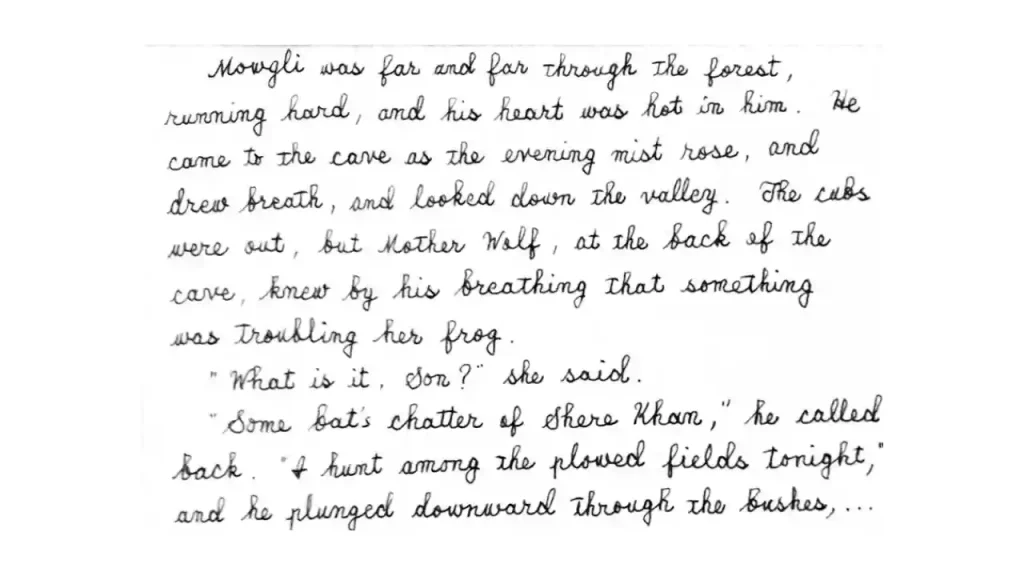Mowgli was far and far through the forest, running hard, and his heart was hot in him.
The Jungle Book
- Japanese grammar
- subject: モウグリ
- predicate: はしる
- modifier: いっしょうけんめい
日本語訳:
モウグリは森の中を一生懸命に走りました。心臓が早鐘を打ちました。
- Kanji, Hiragana
- 一生懸命 / isshoukenmei(いっしょうけんめい, with utmost effort)
- 早鐘を打つ / hayagane wo utsu(はやがねをうつ, to beat a fast bell)
He came to the cave as the evening mist rose, and drew breath, and looked down the valley.
- subject: モウグリ
- predicate: たどりつく
- modifier: どうくつに
夕方の霧が出る頃に、彼はオオカミの洞窟にたどり着きました。息を吸って、谷を見おろしました。
The cubs were out, but Mother Wolf, at the back of the cave, knew by his breathing that something was troubling her frog.
- subject: ははオオカミ
- predicate: きづく
- modifier: モウグリが・なやんでいることに
オオカミの兄弟たちはいませんでした。母オオカミは、洞窟の奥で、モウグリの息遣いを聞いて、彼が何かを悩んでいることに気づきました。
- 息遣い / ikidzukai(いきづかい, breathing pattern)
- 悩み / nayami(なやみ, trouble / worry / distress)
“What is it, Son?” she said.
「どうしたの?息子よ」母オオカミが言いました。
“Some bat’s chatter of Shere Khan,” he called back. “I hunt among the plowed fields tonight,” and he plunged downward through the bushes, to the stream at the bottom of the valley.
- subject: モウグリ
- predicate: かける
- modifier: おがわへ
「シアカンについての噂を聞いたんだ」モウグリが言いました。「今夜、私は耕作地の中にいくよ」
モウグリは駆け下りました。茂みを通り抜けて、谷底の小川のほうへ。
- 噂 / uwasa(うわさ, rumor)
- 耕作地 / kousakuchi(こうさくち, cultivated land / farmland)
- 駆ける / kakeru(かける, to run / dash)
There he checked, for he heard the yell of the Pack hunting, heard the bellow of a hunted Sambhur, and the snort as the buck turned at bay.
- subject: モウグリ
- predicate: こえがきこえる
そしてそこで、モウグリは急に立ち止まりました。狩りをするオオカミの声が聞こえたからです。
獲物の雄鹿の叫び声と、雄鹿が追い詰められた時の荒い鼻息が聞こえました。
- 追い詰める / oitsumeru(おいつめる, to corner / to drive into a tight spot)
Then there were wicked, bitter howls from the young wolves: “Akela! Akela! Let the Lone Wolf show his strength. Room for the leader of the Pack! Spring, Akela!”
- subject: わかいオオカミ
- predicate: あくいのあるこえをあげる
そのとき、悪意のある激しい声が若いオオカミたちからあがりました。
「アキーラ!アキーラ!ローンウルフの強さを見せろ。群れのリーダーの出番だ!跳べ、アキーラ!」
- 悪意 / akui(あくい, malice / ill will)
- 声をあげる / koe wo ageru(こえをあげる, to raise one’s voice / to speak out)
The Lone Wolf must have sprung and missed his hold, for Mowgli heard the snap of his teeth and then a yelp as the Sambhur knocked him over with his forefoot.
- subject: アキーラ
- predicate: しっぱいする
- modifier: かりを
アキーラは跳んで、押さえ込みに失敗したのでしょう。歯が折れる音が聞こえて、それから悲鳴が聞こえたからです。雄鹿が前足でアキーラを引き倒したようです。
- 失敗する / shippai suru(しっぱいする, to fail)
- 悲鳴 / himei(ひめい, scream / shriek)
He did not wait for anything more, but dashed on; and the yells grew fainter behind him as he ran into the croplands where the villagers lived.
- subject: モウグリ
- predicate: いそぐ
モウグリはそれ以上待たずに、急ぎました。
モウグリが村人の住む農耕地を進むにつれて、オオカミたちの大声は薄れました。
- 声が薄れる / koe ga usureru(こえがうすれる, voice fades / voice becomes faint)
“Bagheera spoke truth,” he panted, as he nestled down in some cattle fodder by the window of a hut. “To-morrow is one day both for Akela and for me.”
- subject: バギーラのはなし
- predicate: ほんとう
「バギーラの話は本当だった」小屋の窓辺にある牛の飼い葉に潜り込んで、モウグリは息を切らせて言いました。
「明日は重要な日だ。アキーラと私の両方にとって」
- 本当 / hontou(ほんとう, truth / real / genuine)
- 息が切れる / iki ga kireru(いきがきれる, to run out of breath / to be out of breath)
Reference : The Jungle Book by Rudyard Kipling (project gutenberg)
English Story With Easy Japanese Translation
